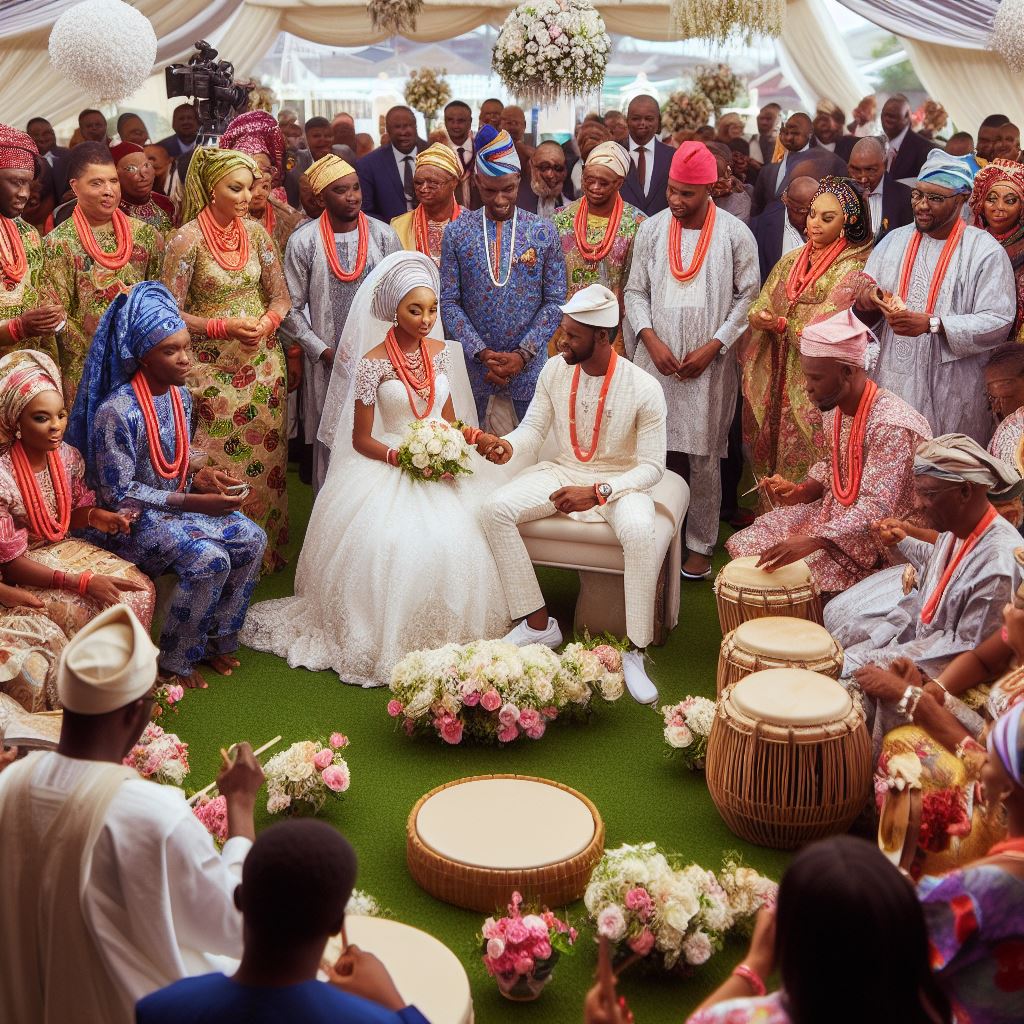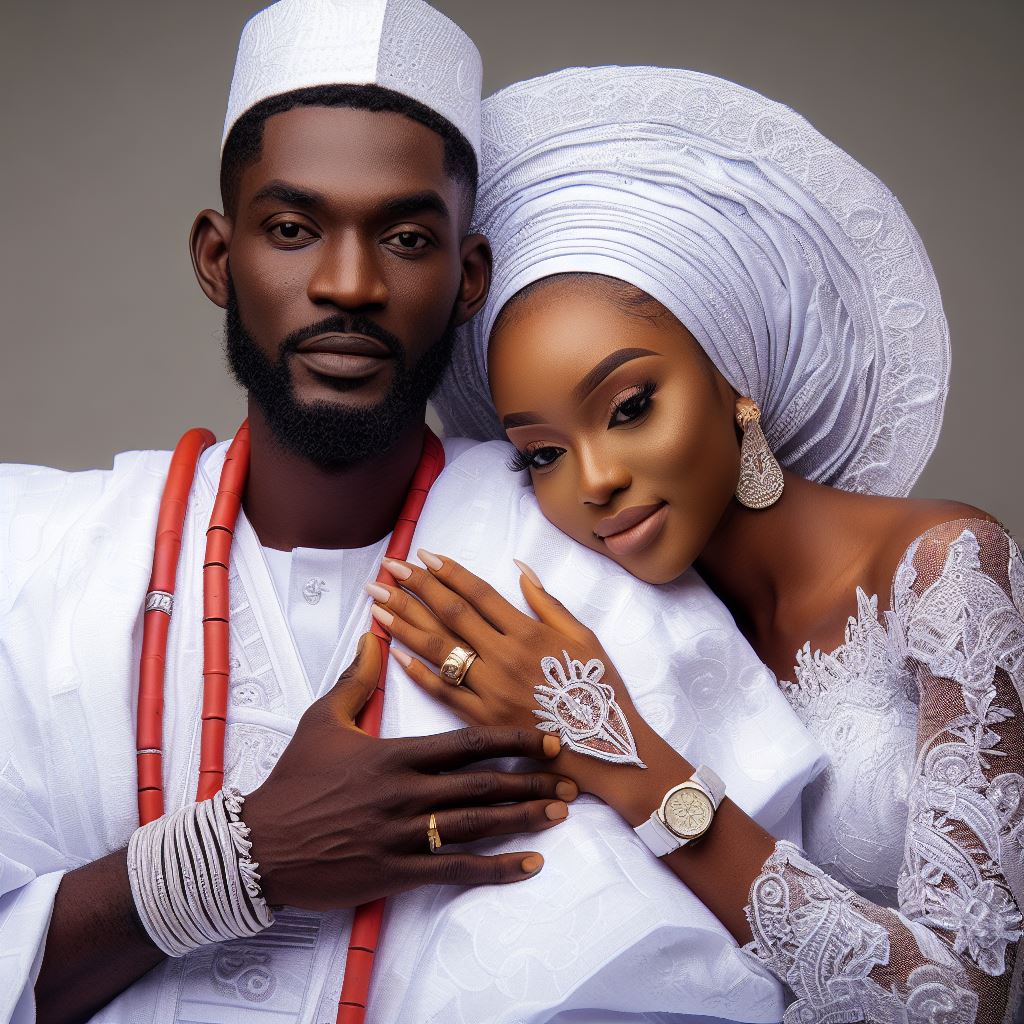Introduction
Explanation of Nigerian marriages
Nigerian marriages are culturally significant and have unique traditions. Nigerian marriages hold great cultural significance, reflecting deep-rooted traditions and customs.
One notable aspect of these marriages is the concept of bride price, which is prevalent across various ethnic groups in the country.
Definition of bride price
- Bride price, also known as dowry, is a payment made by the groom’s family to the family of the bride.
- This payment serves as a symbol of respect and appreciation towards the bride’s family, recognizing the upbringing and investment they have made in their daughter.
- It also acts as a form of financial security for the bride, reflecting the groom’s commitment and ability to provide for her future.
Importance of understanding the significance of bride price
- Understanding the significance of bride price is crucial to appreciate and respect Nigerian culture.
- It allows outsiders to gain insight into the values, traditions, and social dynamics that define these marriages.
- Moreover, comprehending bride price helps foster better relationships between families, as it displays the groom’s willingness to merge with the bride’s family and bear the responsibility of becoming their son-in-law.
- By recognizing the importance of bride price, individuals can engage in meaningful discussions surrounding gender roles, economic dynamics, and cultural identity.
- It promotes cultural knowledge, empathy, and appreciation, contributing to a more inclusive society.
Basically, Nigerian marriages hold cultural significance, with the concept of bride price playing a vital role.
Understanding its importance promotes cultural appreciation and respect, paving the way for greater intercultural understanding and harmonious relationships.
Cultural and Traditional Perspectives
Historical background of bride price in Nigeria
In Nigeria, the practice of bride price has deep historical roots. It dates back to ancient times when marriage was seen as a union between two families rather than just two individuals.
Bride price, also known as dowry, was a way to solidify this union and strengthen the bond between the families involved.
Different cultural practices in Nigeria
Regions and tribes with unique traditions
- Nigeria is a diverse country with over 250 ethnic groups, each with its own cultural practices.
- In some regions, like the Igbo tribe of the southeastern part of Nigeria, bride price plays a significant role in marriage negotiations.
- In other regions, such as the Hausa-Fulani tribe in the northern part, the bride price may be minimal or non-existent.
Examples of specific customs related to bride price
- In Yorubaland, one of the largest ethnic groups in Nigeria, the bride price is paid in various forms.
- It can include cash, gifts, or even services like helping the groom’s family in their farm.
- In some cases, the bride’s family may negotiate for a higher bride price to showcase the value and worth of their daughter.
Symbolism and meaning behind bride price in Nigerian culture
- In Nigerian culture, bride price symbolizes the appreciation and respect for the bride’s family. It is a way for the groom to show his commitment and dedication to his bride and her family.
- The payment of the bride price also signifies the groom’s ability to provide for his future wife and establish a stable and secure environment for their married life.
- The bride price is not seen as a purchase of the bride, but rather as a token of gratitude and recognition for her upbringing and the efforts her family has put into raising her. It is also a way to ensure that the bride will be well taken care of in her new home.
- In some cases, the bride price is seen as a form of social security for the bride. If anything happens to her marriage, she can return to her family with the bride price as a form of financial support. This ensures that she will not be left without resources or options in difficult circumstances.
In short, the significance of bride price in Nigerian marriages is deeply rooted in cultural and traditional perspectives.
It is a symbol of appreciation, respect, and commitment between families and plays a crucial role in establishing the foundation for a successful and harmonious marriage.
While the practices may vary among different regions and tribes, the underlying meaning remains the same – the bride price showcases the value and importance of the bride and her family in Nigerian society.
Read: Igbo Marriage Rites: From Introduction to Celebration
Social and Economic Factors
Bride price, a traditional practice in Nigerian marriages, serves as a significant social and economic factor.
It plays a crucial role in strengthening family bonds, establishing the groom’s status and commitment, promoting family unity and cooperation, as well as carrying economic considerations and implications.
Social significance of bride price
- Strengthening family bonds: The payment of bride price acts as a unifying factor between the families of the bride and the groom.
It symbolizes the merging of two families and creates a sense of kinship and belonging. - Establishing the groom’s status and commitment: Paying an appropriate bride price demonstrates the groom’s ability to provide for his future wife and signifies his readiness to take on the responsibilities of marriage.
It serves as a public declaration of his commitment and willingness to honor and support his wife. - Promoting family unity and cooperation: The negotiation and payment of bride price involve active participation from both families.
It fosters cooperation, understanding, and collaborative decision-making, which contributes to the growth of a strong family unit.
Economic considerations and implications
- Economic value attached to the bride: The bride price carries not only symbolic value but also economic significance.
It represents the value placed on the woman in terms of her contributions to the family, her reproductive capabilities, and her potential to maintain and enhance the family’s social status. - Financial obligations and responsibilities: The payment of bride price imposes financial obligations on the groom and his family.
It necessitates financial preparation and stability to meet the demands of the bride’s family and ensure the economic well-being of the bride within her new marital home. - Bride price as a form of wealth redistribution: In some communities, the bride price serves as a means of redistributing wealth.
It facilitates the transfer of resources from the groom’s family to the bride’s family, helping to bridge economic disparities and promote socio-economic equality.
Essentially, the significance of bride price in Nigerian marriages extends beyond its material implications.
It plays a vital role in strengthening family ties, establishing the groom’s commitment, and promoting family unity.
Additionally, bride price carries economic value, imposing financial obligations and responsibilities on the groom while serving as a form of wealth redistribution.
Understanding these social and economic factors is integral to comprehending the cultural practices and dynamics surrounding Nigerian marriages.
Read: Planning a Yoruba Marriage Function: Top Tips

Gender Dynamics and Feminist Perspectives
Examination of bride price from a feminist lens
- From a feminist perspective, the practice of bride price in Nigerian marriages is seen as a reflection of the patriarchal nature of society.
- It perpetuates the notion that women are objects to be bought and sold, reducing their worth to material goods.
- Furthermore, bride price reinforces gender roles and power dynamics, as women are often expected to be submissive to their husbands.
Criticisms and challenges posed by feminist scholars
Commodification of women
Feminist scholars argue that bride price contributes to the commodification of women, treating them as property to be exchanged.
This reduces women to mere objects and disregards their autonomy and agency in choosing their own partners.
Reinforcement of patriarchal power dynamics
Bride price reinforces the patriarchal power dynamics within marriages, as it places the husband in a position of dominance and control.
It perpetuates the idea that men have the authority to purchase and possess women, reinforcing gender inequality.
Potential for exploitation and inequality
Feminist scholars also highlight the potential for exploitation and inequality that accompanies the practice of bride price.
Women may be forced into marriages against their will, or their families may demand exorbitant sums of money that the groom’s family cannot afford.
This can lead to financial burden and perpetuate cycles of poverty for both families involved.
Counterarguments and alternative viewpoints
- While feminist perspectives shed light on the negative aspects of bride price, it is important to consider alternative viewpoints as well.
- Some argue that bride price can be a symbol of appreciation and respect for the bride’s family, rather than a transactional exchange.
- It can also serve as a form of social security for women, providing them financial stability and protection in the event of divorce or widowhood.
- Additionally, proponents of bride price argue that it maintains cultural tradition and strengthens community ties.
- They believe that abolishing the practice entirely may lead to the erosion of cultural identity and familial values.
- Ultimately, an open dialogue and critical analysis of bride price from various perspectives is necessary to understand its complex implications on gender dynamics in Nigerian marriages.
Read: Nigerian Wedding Traditions: A Comprehensive Guide
Evolution and Modern Practices
Changing attitudes and perceptions towards bride price
In recent years, there has been a noticeable shift in attitudes and perceptions towards the significance of bride price in Nigerian marriages.
Traditionally, bride price was considered a symbolic gesture to honor the bride’s family and establish a bond between both families. However, modern practices reflect changing societal norms.
Examples of modifications in recent times
Various modifications have been observed in the practice of bride price in Nigerian marriages:
Negotiation and flexibility in setting bride price
- One major modification in recent times is the negotiation and flexibility surrounding the setting of bride prices.
- In the past, the amount was predetermined. Now, families engage in open discussions and negotiations for the bride price.
- This shift allows for greater consideration of the financial capabilities and preferences of both families involved.
Collaborative decision-making among families
- Moreover, collaborative decision-making among families has become more prevalent.
- In contrast to the traditional practice, where the groom’s family solely determines the bride price, modern practices emphasize the involvement of both families in making collective decisions.
- Taking a collaborative approach ensures all parties’ interests and opinions are considered.
Alternative forms of ‘bride wealth’
- Some Nigerian communities have introduced alternative “bride wealth” forms, departing from traditional monetary bride price payments.
- These alternative forms may include symbolic gifts, such as livestock, clothing, or household items.
- This shift aims to preserve cultural practices and values while adapting to the changing dynamics of contemporary society.
Influence of globalization and urbanization on bride price
- We cannot overlook globalization and urbanization’s impact on bride price practices
- Access to information and exposure to different cultures have broadened perspectives and challenged traditional practices.
- As Nigerian society connects globally, awareness of customs valuing mutual consent and gender equality grows
Urbanization has also played a significant role in shaping the perceptions surrounding bride price.
Urban migration exposes Nigerians to diverse cultural practices and interactions as they relocate to urban areas.
Exposure prompts a reevaluation of bride price significance. Some choose modern marital arrangements aligned with their values
Ultimately, the evolution of bride price in Nigerian marriages reflects changing attitudes and perceptions towards this age-old practice.
Recent changes, like negotiation, collaborative decision-making, and diverse bride wealth, showcase Nigerian culture’s adaptability to globalization and urbanization
As society evolves, it’s crucial to balance preserving traditions with embracing progressive values in Nigerian marriages
Read: Honour in Marriage: Navigating Challenges with Grace and Respect
Conclusion
Summary of the importance of bride price in Nigerian marriages
The significance of bride price in Nigerian marriages cannot be understated.
Reflection on the complexities and various perspectives
Reflecting on the complexities and various perspectives surrounding bride price reveals its cultural importance.
Call for further discussions and cultural understanding
This calls for further discussions and cultural understanding to appreciate the traditions and values upheld in Nigerian marriages.




